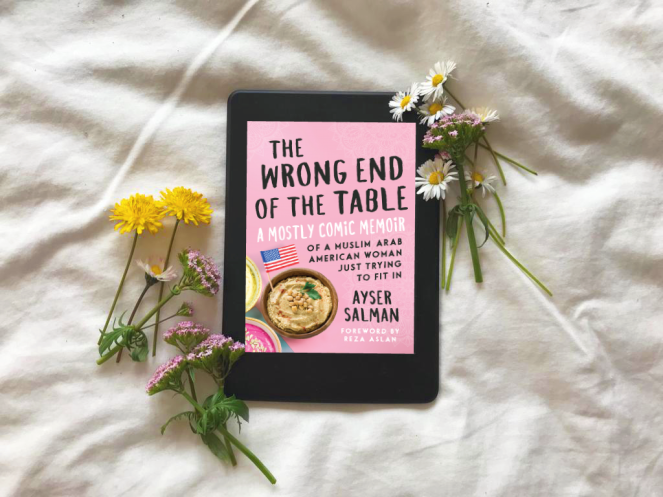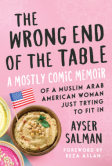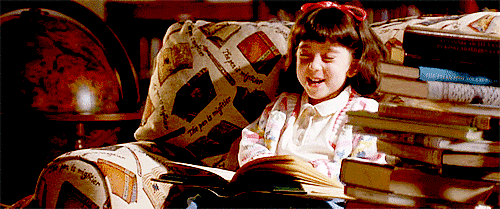
When Rennie @ What’s Nonfiction wrote a blog post last December about books she was excited about, I was immediately attracted to this one. The title and subject matter really drew me in, and so I knew I had to get my hands on it. And I’m so glad I did! This is easily one of the funniest memoirs I have ever read.
 Title: The Wrong End of the Table: A Mostly Comic Memoir of a Muslim Arab Just Trying to Fit In
Title: The Wrong End of the Table: A Mostly Comic Memoir of a Muslim Arab Just Trying to Fit In
Author: Ayser Salman
Genre: memoir, adult
Published on March 5th, 2019 by Skyhorse
Page count: 288 pages
Rating: ⭐️⭐️⭐️⭐️⭐️
💬 s y n o p s i s
Ayser Salman moved to the United States from Baghdad, Iraq, “before it became a curiosity.” She went through all the stages of relocation: Emigration, Naturalization, and Assimilation. In these short, funny personal essays, Ayser guides us through what it has been like being an Immigrant in post-9/11 America. From dealing with religion to becoming an aspiring film editor, Ayser Salman takes the reader on a (very) comic journey.

I know the word “comic” is in the title, but I wasn’t expecting this to be this funny!!! I found myself really actually smiling on the bus while reading this — and everyone knows that’s pretty much the same as laughing out loud! Every time I picked up this book, I felt instantly better. It really did lift me up and make me value a lot of things I took for granted.

I’m honestly so excited to share this review with you, friends! So take a seat, have a warm beverage, and let’s talk about funny Muslim Arab memoirs written by amazing women!!!
💫 Hilarious (and insightful) voice — especially for a memoir!
I know some memoirs can be a little dull, but I’ve had so much luck with the ones I’ve picked up over the last year or so. And, luckily, this memoir was one of the best I have read in a long, long time.
The way Ayser retells events from her childhood, in particular, is phenomenal. Having been bullied for her race and culture cannot have been easy, but she narrates all these horrible events with so much humor, you can’t help but laugh. I mean, how many writers can turn rejecting your crush’s promposal for your parents’ religious beliefs into something hilarious?!
“You know that feeling of being at the wrong end of the table? Like you’re at a fabulous party but all the good stuff is happening just out of earshot? And you’re there trying desperately to contribute and connect, but you’re too far away? Nowadays they call it FOMO (Fear of Missing Out). But I’ve always known it as LAAI — Life as an Immigrant. It’s why I wrote this book.”
💫 Self-deprecating humor is my favorite
Being a memoir detailing a lot of Ayser Salman’s fuck-ups throughout life, it’s no wonder that there’s a fair share of self-deprecating jokes and stories. And I loved every single one of them. From her mistakes while dating in her 20s to peeing herself in front of everyone and playing it as if she had spilled water on her pants, Ayser is a queen when it comes to making fun of herself.
💫 Footnotes. Lots and lots of funny footnotes
I’m crazy about footnotes and this one really piles high with them. Every chapter has heaps of footnotes that add snarky, funny comments to whatever Ayser is telling us about. For example, she will be telling you about that time she was pushed in middle grade and at the same time she is adding footnotes with comments her mom or editor have made about that particular section.
But the author has also added some footnotes to give readers a broader context of what she is writing about. You will see this mostly when you reach the sections in which Ayser Salman writes of living in Saudi Arabia during her teen years. Or when she writes of her early childhood in Baghdad, in which she explains what it was like living in a country almost ready for Saddam Hussein.
If you get a quick out of reading funny footnotes (*ahem* like me), then you’ll most likely want to pick this memoir up…
💫 A detailed look into the inner-workings of the Salman family
In this memoir, we meet not only Ayser but also the people who matter the most to her: her parents. There is obviously a very tight bond connecting Ayser and her parents, and so they make a lot of appearances in the book. Not all of them are positive (what teenager can say they have never thought ill of their parents?) but they’re all heartwarming. You can so truly tell that this is a happy family in their own way.
I loved the mother figure the most. She is the one who is ever present, either in the footnotes telling Ayser to not include excerpt A or B because “it would make you look bad,” or in the actual chapters. This is a woman who loves her daughter more than anything and who would do anything for her.
Ayser’s father is also a very hilarious character. There’s a point in the novel in which the author narrates her trip to Hawaii with her parents. They hadn’t been out of the country much (except in the Middle East) and are two very funny characters together. But Ayser’s dad’s observation that “Hawaii comes from Arabic” really cracked me up. I loved seeing this man claw at the thinnest of evidences of a linguistic relationship between the two. For someone who has studied linguistics before, this was one of the funniest parts of the memoir.
💫 What’s assimilation? Adapting to American culture
As you might have noticed, there is a lot of content on this memoir about feeling like you belong and feeling hostility against your presence. Ayser, as an Immigrant from a Muslim Arabic country, experiences difficulties assimilating with American culture, despite having been born and mostly raised in the country.
We see this happen not just when she is little and packs a lunch to take to school that is (worlds) different from what her friends take. We also see this in how people pronounce her name (incorrectly), in how people make fun of her for having hairs on her upper lip (which she describes as typically Iraqi), and in how people react when they learn she is Iraqi.
I would say that this is the most ~serious~ part of the whole memoir, and Ayser doesn’t dismiss the topic like she does other things in a funny way. She confronts what it’s like to be Muslim Arabic in Ameria before and after the 9/11 attacks, and explains how she managed to get her own voice.
“It’s a chicken or egg thing: which came first, my neurosis or my immigrantness?”
💫 Interesting account of what it’s like working in the movie industry
Ayser Salman moved to California to get involved in the movie industry, and she actually succeeded. In this memoir, she tells us how she got her role as a film editor and what her job consisted of. I have never really understood what movie editing or production entails, so these chapters were interesting in the sense that they showed me a world I had never paid attention to.
Another thing I liked about these chapters was how the author doesn’t speculate about the Harvey Weinstein scandal. Given that she worked there, some people might think that she knew him and knew of his actions. But Ayser flat out admits never having met the man and not wanting to take over the #metoo conversation.
However, this isn’t to say that she doesn’t talk about being a woman (and specifically a Muslim Arabic woman) in the workplace. The last chapters of the memoir are a more serious insight into claiming your own space and your own voice, regardless of what others around you say. While they don’t read like the rest of the memoir, they are a great addition to the collection.
💫 There is a lot to be taken from this memoir
Since Ayser Salman wrote this memoir from her point of view, we get a lot of great cultural insight, both into the Iraq she lived in, into Saudi Arabia, and into America. As a person who never completely fit into any of these countries, whether because she didn’t see herself as being from there or because others treated her like an outsider, her comments are especially remarkable. Her voice is so poignant and so spot on, that it’s hard to disregard her observations.
There is also a lot to be learned from this memoir in terms of how we treat people who are from another country. As I’ve mentioned before, the author experienced racism throughout different stages of her life, and she remarks feeling like she’s on the outside looking in because the door was closed to her. This is an issue Ayser goes into depth about, and also a metaphor I found delightfully clear to anyone who has never experienced this.

💬 Favorite quotes 💬
When I read a book that I plan on reviewing, I’m always paying attention to what quotes could reflect the mood of the story or the author’s writing style. And so, I have selected a few that I really liked.
“Dialogue and storytelling are important. Forty-something years if a long time for someone to feel like an outsider in a nation made up of immigrants. For that reason, I decided to share my story in the hopes that we can save America from an inevitable future population of forty-something-year-old outsiders — immigrants or not.”
“I had never felt so isolated and fearful because of where I was from. Even though I was an American citizen and technically could not be kicked out of the country, I hailed from a place we were at war with. I didn’t want to hear any ignorant, racist diatribes from my classmates and the people I considered friends. Dammit, I had finally found my “place at the table” and felt comfortable being truly me. I wasn’t thrilled to about the possibility of losing it because of the inconvenient political climate in my former home.”
“Sometimes you’re at the wrong end of the table, and sometimes you’re in the middle of the action. But it’s never permanent. We all end up at the wrong end of the table at some point in our lives.”

I recommend this memoir to…
⭐️ Anyone who would like to see things from the point of view of a Muslim-Arab-American woman
⭐️ All lovers of tongue-in-cheek, funny memoirs
⭐️ Those interested in immigrant points of view
This is a really good memoir, and I can’t say that enough. I hope my review has done it justice, and hope even more than you pick it up and give it a shot. You might be surprised by how much you end up laughing at Ayser Salman’s remarks…

Disclaimer: I received a review copy of this memoir in exchange for an honest and unbiased review, which is what I have written. Thank you again to the publisher for giving me the chance to read and review Ayser Salman’s story.
Oh wow, this sounds great! I’ll have to look into it! Also, have you read One Day We’ll All Be Dead and None of This Will Matter by Scaachi Koul? It is a really funny memoir of an Indian woman growing up in Canada that sounds pretty similar 🙂
LikeLiked by 2 people
I have not! Adding it to my TBR now — it looks really cool, and a great read for the YARC2019! I’m so happy my review made you interested in the book 💕
LikeLike
This book sounds great–thanks for such a thorough review! I’ll definitely be checking this one out.
LikeLiked by 1 person
Thank you so much! I really hope you enjoy it, it was so great to read 🤗
LikeLiked by 1 person
Wonderful review, and so thorough! I can completely see why you liked this one so much. I’m so glad I could put it on your radar! You know what’s so funny, I read it too and I wasn’t crazy about it 😦 I guess it was a combination of the voice and the style, or a different sense of humor or something… it just didn’t work for me and I was so disappointed. But I’m thrilled I could in some small way help to get it to you! Great to read your thoughts on it.
LikeLiked by 1 person
Ahhh that is such a pity! I do see how it could be not for everyone, so I’m super glad your recommendation didn’t fail me 😊
LikeLike
The Wrong End of the Table is a wonderful book. At times hilarious, at times quirky, always delightful! Thanks for sharing… 😊
LikeLike
You’re welcome! Glad you enjoyed the book too 😄
LikeLike